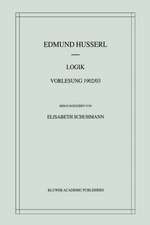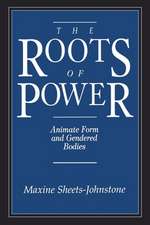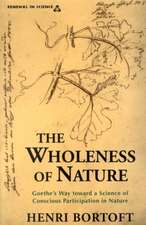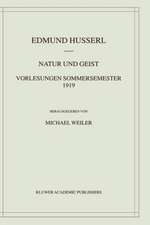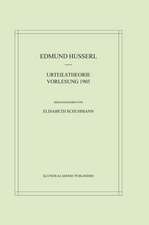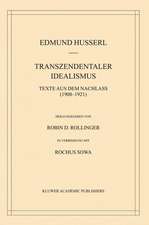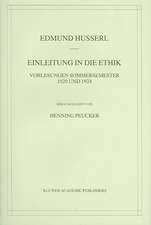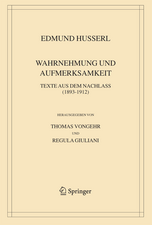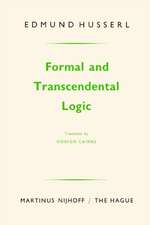Crisis of European Sciences and Transcendental Phenomenology: Studies in Phenomenology and Existential Philosophy
Autor Edmund Husserl Traducere de David Carren Limba Engleză Paperback – iun 1970
The Crisis of European Sciences and Transcendental Phenomenology, Husserl's last great work, is important both for its content and for the influence it has had on other philosophers. In this book, which remained unfinished at his death, Husserl attempts to forge a union between phenomenology and existentialism.
Husserl provides not only a history of philosophy but a philosophy of history. As he says in Part I, "The genuine spiritual struggles of European humanity as such take the form of struggles between the philosophies, that is, between the skeptical philosophies--or nonphilosophies, which retain the word but not the task—and the actual and still vital philosophies. But the vitality of the latter consists in the fact that they are struggling for their true and genuine meaning and thus for the meaning of a genuine humanity."
Husserl provides not only a history of philosophy but a philosophy of history. As he says in Part I, "The genuine spiritual struggles of European humanity as such take the form of struggles between the philosophies, that is, between the skeptical philosophies--or nonphilosophies, which retain the word but not the task—and the actual and still vital philosophies. But the vitality of the latter consists in the fact that they are struggling for their true and genuine meaning and thus for the meaning of a genuine humanity."
Din seria Studies in Phenomenology and Existential Philosophy
-
 Preț: 181.76 lei
Preț: 181.76 lei -
 Preț: 194.88 lei
Preț: 194.88 lei -
 Preț: 329.98 lei
Preț: 329.98 lei -
 Preț: 255.61 lei
Preț: 255.61 lei -
 Preț: 314.27 lei
Preț: 314.27 lei -
 Preț: 255.38 lei
Preț: 255.38 lei -
 Preț: 306.62 lei
Preț: 306.62 lei -
 Preț: 339.71 lei
Preț: 339.71 lei -
 Preț: 272.32 lei
Preț: 272.32 lei -
 Preț: 265.89 lei
Preț: 265.89 lei -
 Preț: 221.59 lei
Preț: 221.59 lei -
 Preț: 215.68 lei
Preț: 215.68 lei -
 Preț: 275.22 lei
Preț: 275.22 lei -
 Preț: 245.79 lei
Preț: 245.79 lei -
 Preț: 269.44 lei
Preț: 269.44 lei -
 Preț: 215.68 lei
Preț: 215.68 lei -
 Preț: 240.26 lei
Preț: 240.26 lei -
 Preț: 235.17 lei
Preț: 235.17 lei -
 Preț: 215.94 lei
Preț: 215.94 lei -
 Preț: 248.05 lei
Preț: 248.05 lei -
 Preț: 226.89 lei
Preț: 226.89 lei -
 Preț: 137.25 lei
Preț: 137.25 lei -
 Preț: 241.92 lei
Preț: 241.92 lei -
 Preț: 165.56 lei
Preț: 165.56 lei -
 Preț: 242.51 lei
Preț: 242.51 lei - 18%
 Preț: 698.05 lei
Preț: 698.05 lei -
 Preț: 195.68 lei
Preț: 195.68 lei -
 Preț: 267.53 lei
Preț: 267.53 lei -
 Preț: 223.63 lei
Preț: 223.63 lei -
 Preț: 220.74 lei
Preț: 220.74 lei -
 Preț: 314.03 lei
Preț: 314.03 lei - 21%
 Preț: 480.24 lei
Preț: 480.24 lei - 11%
 Preț: 274.46 lei
Preț: 274.46 lei - 11%
 Preț: 214.35 lei
Preț: 214.35 lei - 10%
 Preț: 232.06 lei
Preț: 232.06 lei - 11%
 Preț: 229.67 lei
Preț: 229.67 lei - 6%
 Preț: 331.75 lei
Preț: 331.75 lei - 36%
 Preț: 165.14 lei
Preț: 165.14 lei -
 Preț: 139.02 lei
Preț: 139.02 lei - 11%
 Preț: 228.57 lei
Preț: 228.57 lei - 12%
 Preț: 204.99 lei
Preț: 204.99 lei - 13%
 Preț: 252.48 lei
Preț: 252.48 lei - 13%
 Preț: 251.36 lei
Preț: 251.36 lei - 23%
 Preț: 588.68 lei
Preț: 588.68 lei
Preț: 250.29 lei
Nou
Puncte Express: 375
Preț estimativ în valută:
47.90€ • 49.82$ • 39.54£
47.90€ • 49.82$ • 39.54£
Carte disponibilă
Livrare economică 24 martie-07 aprilie
Preluare comenzi: 021 569.72.76
Specificații
ISBN-13: 9780810104587
ISBN-10: 081010458X
Pagini: 405
Dimensiuni: 152 x 229 x 30 mm
Greutate: 0.6 kg
Ediția:1
Editura: Northwestern University Press
Colecția Northwestern University Press
Seria Studies in Phenomenology and Existential Philosophy
ISBN-10: 081010458X
Pagini: 405
Dimensiuni: 152 x 229 x 30 mm
Greutate: 0.6 kg
Ediția:1
Editura: Northwestern University Press
Colecția Northwestern University Press
Seria Studies in Phenomenology and Existential Philosophy
Notă biografică
EDMUND HUSSERL (1859–1938) born in Moravia in 1859, was educated in Vienna and Berlin in mathematics and the physical sciences. Beginning in 1884, he decided to devote himself to philosophy. He later held professorships at the Universities of Halle, Göttingen, and Freiburg until his retirement in 1928. He died in 1938. Among his many published works is Experience and Judgment, also available from Northwestern University Press.
Cuprins
Translator's Introduction
Part I. The Crisis of the Sciences as Expression of the Radical Life-Crisis of European Humanity
Part II. Clarification of the Origin of the Modern Opposition between Physicalistic Objectivism and Transcendental Subjectivism
Part III. The Clarification of the Transcendental Problem and the Related Function of Psychology
A. The Way into Phenomenological Transcendental Philosophy by Inquiring back from the Pregiven Life-World
Part III B. The Way into Phenomenological Transcendental Philosophy from Psychology
Appendixes
A. The Vienna Lecture
I. Philosophy and the Crisis of European Humanity
B. Supplementary Texts
II. Idealization and the Science of Reality—The Mathematization of Nature
III. The Attitude of Natural Science and the Attitude of Humanistic Science, Naturalism, Dualism and Psychophysical Psychology
IV. Philosophy as Mankind's Self-Reflection; the Self-Realization of Reason
V. [Objectivity and the World fo Experience]
VI. [The Origin of Geometry]
VII. [The Life-World and the World of Science]
VIII. Fink's Appendix on the Problem of the "Unconscious"\
IX. Denial of Scientific Philosophy. Necessity of Reflection. The Reflection [Must Be] Historical. How Is History Required?
X. Fink's Outline for the Continuation of the Crisis
Index
Part I. The Crisis of the Sciences as Expression of the Radical Life-Crisis of European Humanity
Part II. Clarification of the Origin of the Modern Opposition between Physicalistic Objectivism and Transcendental Subjectivism
Part III. The Clarification of the Transcendental Problem and the Related Function of Psychology
A. The Way into Phenomenological Transcendental Philosophy by Inquiring back from the Pregiven Life-World
Part III B. The Way into Phenomenological Transcendental Philosophy from Psychology
Appendixes
A. The Vienna Lecture
I. Philosophy and the Crisis of European Humanity
B. Supplementary Texts
II. Idealization and the Science of Reality—The Mathematization of Nature
III. The Attitude of Natural Science and the Attitude of Humanistic Science, Naturalism, Dualism and Psychophysical Psychology
IV. Philosophy as Mankind's Self-Reflection; the Self-Realization of Reason
V. [Objectivity and the World fo Experience]
VI. [The Origin of Geometry]
VII. [The Life-World and the World of Science]
VIII. Fink's Appendix on the Problem of the "Unconscious"\
IX. Denial of Scientific Philosophy. Necessity of Reflection. The Reflection [Must Be] Historical. How Is History Required?
X. Fink's Outline for the Continuation of the Crisis
Index
Descriere
The Crisis of European Sciences and Transcendental Phenomenology, Husserl's last great work, is important both for its content and for the influence it has had on other philosophers. In this book, which remained unfinished at his death, Husserl attempts to forge a union between phenomenology and existentialism.



